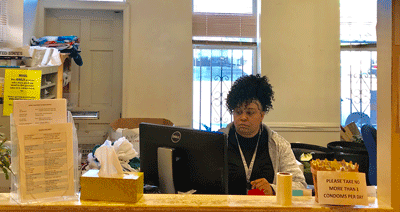The Manna House, a community resource for needy and homeless individuals in Baltimore City, plans to expand its facilities in 2019 in order to provide more services to their clients.
Located on East 25th Street, this organization has been serving free hot breakfasts to underprivileged community members in Baltimore City for 53 years.
“It’s important to us that people get fed,” said case manager Patty Feick, who has been working at the Manna House for nearly five years. “We try to set people up so they can at least have their basic needs met, so they can get to the important stuff like finding housing and a job.”
In addition to serving breakfast, the Manna House provides a diverse array of services to the struggling and homeless individuals of Baltimore City. Clients can access shower facilities, apply twice a month for clothing, have mail delivered to the Manna House’s address, receive food bank vouchers, and access weekly on-site healthcare services.
“I’ve been coming here for about five years,” said Fred Owens, a Manna House client. “This place is awesome— they bend over backwards to help you.” Another client, Leonard Wayne Wright III told The Baltimore Times, that facilities like the Manna House can help provide the dignity its clients need to better their lives.
“We all need a support team,” he said. “I come here because of the showers. As long as I got my shower, I say thank you God because I want to be clean.”
Jennifer Dubreuil has been the program manager of the Manna House for the past decade. She expressed hope that the facility’s upcoming expansion project will allow it to help more clients in a wider variety of ways.
“We want NA and AA groups to be able to hold meetings here, we want a computer lab, job training programs,” Dubreuil told The Baltimore Times. “We’re planning to double our dining area, which means clients won’t be waiting outside as long or at all.”
Construction is expected to start in April, expanding the space into the buildings next door. The 1.2 million dollar project is funded by a combination of grants and donations. During the renovation, Feick and Dubreuil emphasize that the Manna House will remain open.
“We’ll find a way to provide some kind of a meal. We do plan to feed people one way or another,” said Feick.
“We’re the only agency in Baltimore that’s open seven days a week, because our clients rely on it,” added Dubreuil. “We will probably have to scale back services [during construction], but our clients are our top priority.”
The Manna House serves clients from a variety of backgrounds, and recent years have seen an increase in housed individuals seeking the organization’s services.
“The cost of living is rising at a very rapid pace, but the wage earned is not. Low-income clients end up spending all of their money on rent and not having enough left for food,” said Dubreuil. “We are not only serving homeless people, but also a greater amount of low-income people because of the nature of the economy.”
The Manna House relies largely on volunteer work and private donations. The organization is especially eager to receive fresh fruits and vegetables, coffee, sugar, creamer, and donated clothing. Organizations can also make a monetary donation to sponsor a breakfast, or send members to help serve food and organize the dining room.
“The volunteers are great. They don’t look down on nobody,” said Owens, who also expressed overall appreciation for the organization’s staff and services. “I can’t say nothing bad about it.”
Wright added that he considers the Manna House an invaluable community resource.
“These things help people out,” he said. “You’re saving people’s lives when you open up these organizations.”
